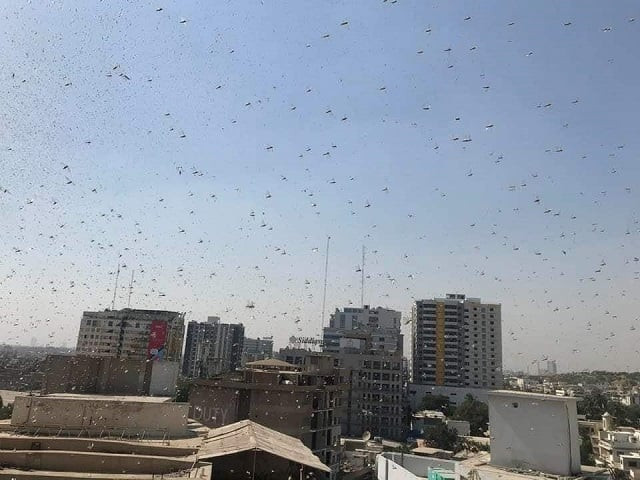WATCH: Desert locusts descend upon Karachi
Citizens post footage of Tiddi Dal filling the city's skies

Known as Tiddi Dal in Pakistan, the insects were seen filling the skies. The swarms of the insect have come from Thar, Sanghar and Dadu parts of Sindh.
While Sindh Agriculture Minister Ismail Rahoo has released a video message saying that the locusts are headed to Balochistan after spending the night in Karachi.
Rabies Aur dengue kay baad ub locusts Karachi phonch Gaye pic.twitter.com/xa6yOMIq87
— omar r quraishi (@omar_quraishi) November 11, 2019
Rahoo added that the locusts were in the Malir area and had not harmed any crop so far.
https://twitter.com/ayeshamysore/status/1193800182997114880
He said the provincial government had already sent teams to the affected areas.
Sindh, Centre look to each other for locust control as farmers fear for crops
Rahoo urged people to remain calm as the locusts would not harm them in any way.
#Karachi: Swarms of Locusts invade #BalochColony & Shahra-e-Faisal right now. (12:40pm) #KHIAlerts pic.twitter.com/IBeR09KIiA
— SherY (@SherySyed2) November 11, 2019
"We have sprayed pesticides in Nawabshah, Badin and Sanghar," he added.
Locust invasion in Karachi. The last major attack took place in 1961 (pic 2). According to experts, the locusts have flown in from the coastal areas of Balochistan. They believe this invasion is due to heavy rains in Sindh and Balochistan during the monsoon season. pic.twitter.com/baiJBgWJ0w
— Nadeem Farooq Paracha (@NadeemfParacha) November 11, 2019
On a lighter note, the provincial minister said,"Yes, they [citizens] should make use of the opportunity to cook them."
Locusts are short horned grass hoppers and desert locusts of Africa and Asia are normally solitary, however, spring rains trigger a behavioural transformation that can results in a swarms of locust. A single swarm ranges from 100,000 to 1 billion locusts.


















COMMENTS
Comments are moderated and generally will be posted if they are on-topic and not abusive.
For more information, please see our Comments FAQ